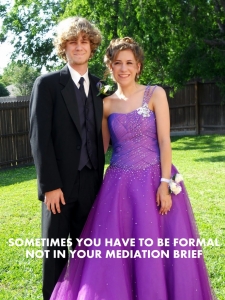Mediation Phases
Like the moon, mediation proceeds in phases. Here’s a primer on what happens when.
The first phase of a mediation consists of fact gathering and defining the issues. When the parties provide exhaustive briefs, time spent on fact-finding may be minimal. We can quickly pin down which facts and issues the parties agree or disagree on.Sometimes people agree on the facts, but not how to interpret those facts. Ferreting out those disagreements is part of defining the issues. Usually case resolution will turn on fewer than five pivotal issues.As we drill down, disagreement about a fact may emerge, but a participant may be able to get the evidence to resolve the question during the mediation. Perhaps the information was not previously shared because it was not obvious this was an issue, or someone may have been playing hide-the-ball. The employer’s side in a workers compensation case should bring a copy of the indemnity and medical payment print-outs to the mediation.
If no one can access the needed information during the mediation, we can usually put that issue aside and continue to mediate to resolution. But if that piece of the puzzle is critical, we might adjourn the mediation to allow time to gather those details with a commitment to resume on a specified date.
Mediation is not the time to declare you need additional discovery. For purposes of negotiation, let’s assume that each side’s discovery efforts would produce information favorable to that party. If the case settles, no one need undertake that expense.
Phase 2: Working With The Numbers
Now that we know what we’re dealing with, it’s time to talk about value. Sometimes parties have exchanged offers and demands prior to mediation, but often they were waiting for this meeting. If everyone was together in joint session until this point, now may be the time to go into caucus, separate private meetings with the mediator.
Once in caucus, parties can be candid about the strong and weak points of their case. Nothing said in caucus will be shared with the other side unless you authorize it to be shared. Moreover, per statute, no communication between any participants made exclusively within mediation can be used in any civil forum.
Occasionally, a party has a secret reason for wanting to settle that has nothing to do with the case itself. Here are some real-life examples from my mediations that show the importance of confidentiality. An injured person planned to move to another country. A defendant company was negotiating a buy-out; they were undergoing a fiscal review and wanted to get this potential liability off the books. In each case they told me these things, but the information went no further.
While remaining neutral, the mediator gently helps each side form their offers of settlement and communicates them to the other party. Sometimes this entails restating a party’s position in a way to avoid unnecessary antagonism.
As information and offers are exchanged, parties converge on resolution. If everyone is unwilling to go one step further, and it seems resolution is close, the mediator may suggest a “mediator’s proposal.” This allows parties to settle while saving face and can reduce dissatisfaction within the attorney-client relationship.
Phase 3: Documenting the Agreement
We have a deal, and now everyone gets back together. Parties are encouraged to bring a draft agreement to the mediation. If they must return to their offices to hammer out the final document, before leaving the mediation everyone should sign a stipulation of settlement or Memorandum of Understanding which recites the agreed-upon terms.
Putting words to paper can call parties’ attention to missing details. Now is the time to consider the What If’s.





